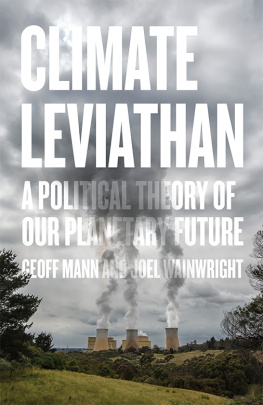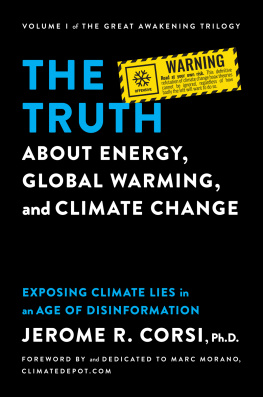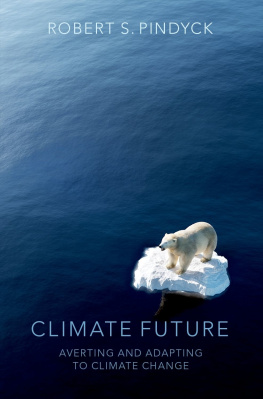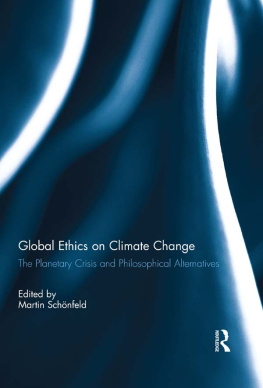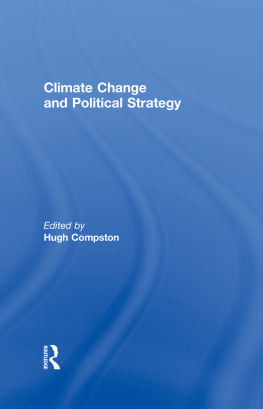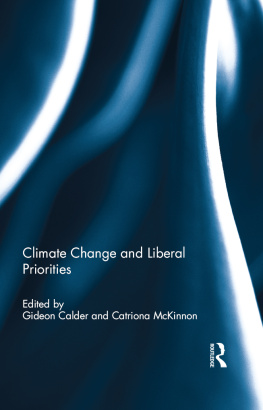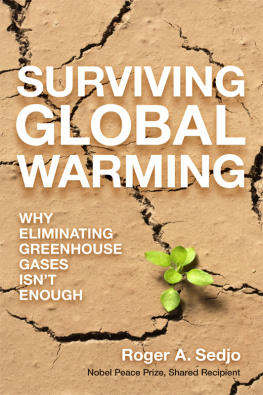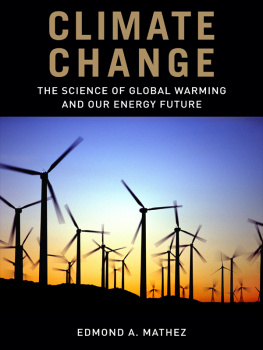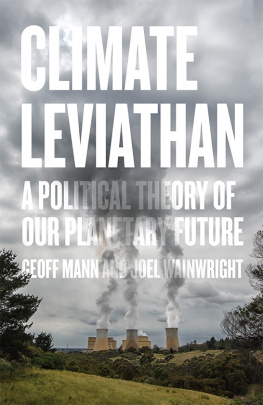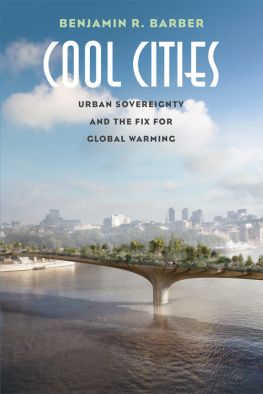For most of our lives, we have thought of climate change as a threat looming on the horizon, a challenge that would, perhaps soon, need to be faced. Those days are past. Today, all around the world, the menace we worried about is no longer merely potential, but has rapidly materialized. Record-breaking temperatures on every continent. Rates of extinction so high that the only relevant comparisons are to planetary cataclysms far beyond human memory. Species and ecosystems scrambling to change their geographical range andwhere they cannot move quickly, as with coral reefsperishing altogether. Rising seas, forests ablaze, glaciers disappearing, superstorms. The underlying cause is well known. The increasing proportion of certain trace gases in the Earths atmosphere (in round numbers, carbon dioxide [CO2] has risen from 250 to 400 parts per million, methane [CH4] from 700 to 1700 parts per billion) means a larger proportion of the suns energy remains in the Earths seas, land masses, and atmosphere, changing the movement of heat energy through the worlds climatic system. As global temperatures rise, the weather changes too. Not just the unbearable summer days that now plague cities across the planet, but highly variable precipitation bringing flood or drought, volatile temperature changes, and more intense storms. This is already taking a toll on everyone, but the heaviest weight of all has fallen on relatively poor and powerless people, as well as the other living things with whom we share this planet. The troubles caused by climate change are accelerating so quickly that we have no ledger capable of measuring them.
We have long known what we need to do to tackle climate change: stop taking carbon (the C in CO2 and CH4) from the Earths crust and pumping it into the atmosphere. This means no more extracting and burning coal, oil, and gas. We need to leave fossil fuels in the Earths crust, where they were formed. It would also make a big difference if we stocked far fewer cows and stopped cutting forests. Had such measures been taken by those who had the capacity to do so, we probably could have averted the terrible implications of climate change. But they were not. The vast proportion of historical greenhouse gases have been emitted as byproducts of the choices and activities, not of the masses of ordinary people, but rather of a wealthy minority of the worlds people. Why that wealthy minority did nothing, and what that means for our political futures, are crucial questions we address in this book.
Though we contend with climate change now, its most significant ecological and political consequences are still to come. The challenge of analyzing and anticipating those consequences is enormous. This is partly because both the planets ecologies and its politics are extraordinarily complex and subject to an almost infinite variety of influences, and partly because climate change is changing what it means to be human on Earth. But, in another sense, the term Anthropocene is unhelpful, because climate change also makes it clear that there is no such thing as a universal human agent that precipitated this new era in planetary history, and no such thing as a common vantage point from which we all understand and experience it. There are, rather, only different human communities and ways of reasoning our way through our time.
This book offers a political theory of our planetary future. Our work on these ideas began in the heady days before the 2009 Copenhagen climate summit, a time when we each spoke publicly on these matters. This project emerged as an attempt at self-critique and clarification from within the climate justice movement. We draw upon a robust tradition of political philosophy and critique of capitalist political economy to explain why capitalist societies created our planetary emergency and have failed to mitigate climate change. It is not, however, just another Marxist critique of capitalisms ecological consequences (valuable as those contributions have been). Rather, we are interested in the political effects of these consequences. Rapid climate change will transform global political economy and alter our worlds basic political arrangements, processes we call the adaptation of the political. Our point is not that global warming will simply cause everything to change or collapse. Instead, we argue that under pressure from climate change, the intensification of existing challenges to the extant global order will push existing forms of sovereignty toward one we call planetary. To advance these arguments, we engage with a wide range of both classical sources and more recent philosophical attempts to grasp nature, political economy, and sovereignty. The result is a contribution to a political philosophy of planetary climate change, one we hope is adequate to our conjuncture. In , we sketch the outlines of a radical alternative.
The world is getting hotter fast, and the rapid, large-scale carbon mitigation the world needs is impossible without radical change in the existing political-economic structure.
While we struggle, as we must, to limit rapid climate change by mitigations great and small, we also have to think carefully about its likely political consequences, because a world environment as radically changed as climate science suggests will have massive impacts on the way human life on Earth is organized. These questions are on the minds of many, from novelists to physical scientists, from military strategists to organic intellectuals of subaltern social groups. Yet political theory on these questions lags far behind atmospheric chemistry and the physics of ocean heat. This is a major gap. A stable concept of the political can only hold in a relatively stable world environment; when the world is in upheaval, so too are the definition and content of the realm of human life we call political. Political theory thus has a place in natural history and finds its meaning through critical reflection upon it. Whether we know it or not, all our thinking is environmental, even when it rebels against nature.
Unfortunately, the prospect of rapid environmental change has generally produced an insufficient theoretical response among mainstream progressive thinkers. Most of it is pious utopianism (ten simple ways to save the planet), an appeal to market solutions (cap and trade), or nihilism (were fucked).fundamental. They are the core goals of the struggle for justice in a world that will be radically transformed by climate change. Consequently, our goal is to make climate more political. That requires a theorya way to conceptualize our conjuncture and understand the relationship between the categories we use to make sense of itthat can help us navigate a hotter planet and the inevitable political-economic changes it will elicit. That kind of theory should embrace sciences analysis of environmental change but not expect too much of it politically; it should try to understand the worlds possible political-ecological futures without lapsing into environmental determinism; and it should anticipate the coming socio-ecological transformations as a moment of transition in natural history. We offer this book as a contribution toward that theory and the struggles it might inform. Even if our theory turns out to be wrong, it will be worthwhile if it offers a vision of alternatives without appealing to false hopes.

